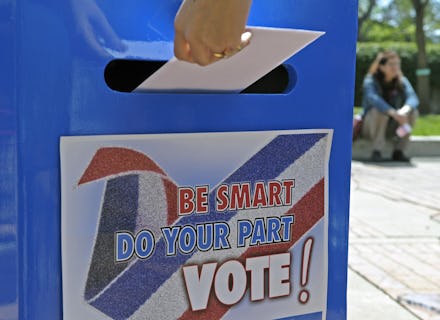How to vote absentee: Here's everything to know about absentee deadlines and more

Every year, millions of people in the United States cast their votes by mail using an absentee ballot. And every year, a good fraction of those votes go uncounted due to a few simple errors on the voter's part.
According to NPR, these mistakes include everything from forgetting to sign the back of the envelope, to using the wrong envelope, to mailing in the envelope but forgetting to include the most important component: the ballot itself. (Seriously — don't forget the darn ballot.)
A survey from the Election Assistance Commission — an agency whose inception was inspired by the infamous recount mishap of the 2000 George W. Bush-Al Gore election — found a staggering 3.2 million ballots went uncounted nationwide in 2006. With the stakes higher than ever in this year's presidential election, suffice it to say it would be a huge bummer to sit out of the democratic process just because you forgot to sign an envelope.
But first, it's important to make sure you qualify for an absentee ballot at all. While many states like Arizona, California, Maine and Maryland allow any registered voter to apply for an absentee ballot, other states, including Pennsylvania, South Carolina, Tennessee and Virginia, delineate specific conditions under which a person can vote absentee.
Once you're sure you qualify, states have options to apply and receive an absentee ballot in-person and to apply online and receive one by mail. Vote.org has done all of the leg work and created a handy Google doc that lays out, state by state, deadlines to apply for absentee ballot and when to hand it in. And, if push comes to shove, they've even included a contingency plan for what to do if you miss the deadlines.
The best way to guarantee your vote counts, according to NPR, is to make sure your ballot arrives at its destination by Election Day (or, in the case of states like Louisiana or Minnesota, the day before Election Day). So long as you mail in your ballot with ample time for delivery, there's no need to fear.
Alysoun McLaughlin, deputy director of the board of elections in Montgomery County, Maryland, told NPR of the dangers of "just in case" voters — voters who fear their ballots won't make it in time and go to vote in person. Voting twice, NPR reminds, is illegal and will automatically cancel out your vote entirely.
One vote is all it takes — just make sure you do it right.